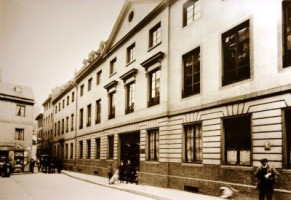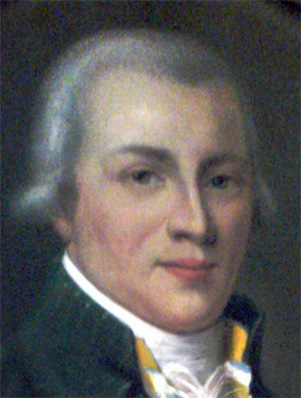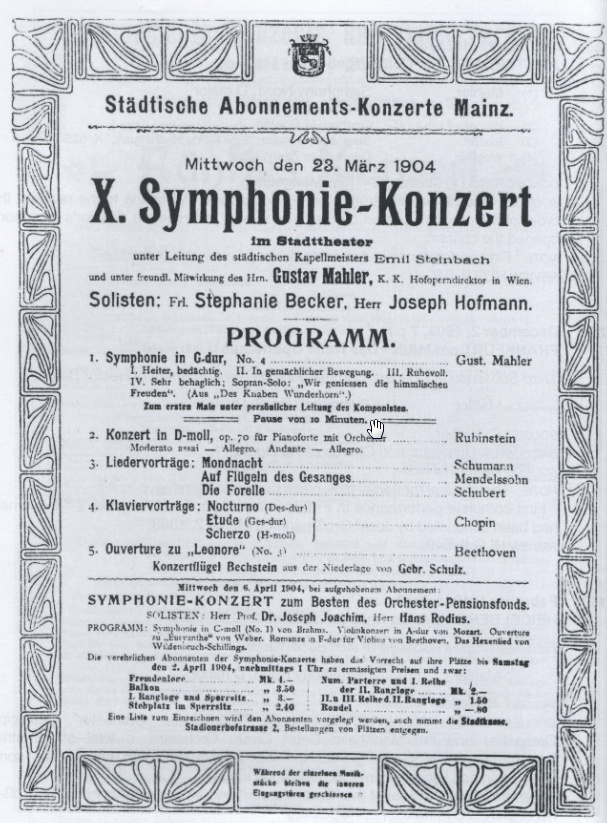- Also: Bernhard Schott, Schott Musik International, Scott Music, Bernhard Scott and Sons, Scott & Sons, Fa. Scott, Edition Schott, B. Schott & Sohne
- Music publishers.
Bernhard Schott (1748-1809).
- Bernard Schott (1748-1809).
- Profession: Publisher of music, Founder Schott Music, “Bernhard Schott and Sons”.
- Residences: Mainz.
- Relation to Mahler:
- Correspondence with Mahler:
- Born: 10-08-1748 Eltville, Mainz, Germany.
- Died: 26-04-1809 Sandhof/Heidesheim, Mainz, Germany.
- Buried: 00-00-0000
Schott Music is one of the oldest German music publishers. It is also one of the largest music publishing houses in Europe, and is currently the second oldest music publishing house. The company headquarters of Schott Music was founded by Bernhard Schott in Mainz, Germany in 1770.
Schott Music is one of the world’s leading music publishers. It represents many of the greatest composers of the 20th and 21st centuries, and its publishing catalogue contains some 31,000 titles on sale and over 10,000 titles on hire. The repertoire ranges from complete editions, stage and concert works to general educational literature, fine sheet music editions and multimedia products.
In addition to the publishing houses of Panton, Ars-Viva, Ernst Eulenburg, Fürstner, Cranz, Atlantis Musikbuch and Hohner-Verlag, the Schott group also includes two recording labels, Wergo (for new music) and Intuition (for Jazz), as well as eight specialist magazines.
The Schott Music group also includes the printing and production services company WEGA, as well as mds (music distributors services GmbH), the largest music product distribution organisation in Europe providing the distribution of sheet music, books, magazines, audio and audio-visual recordings, and hire materials of both the Schott catalogues and the catalogues of 60 other music publishers.

Fa. Schott in Mainz, Germany.
Representing composers and authors from all over the world, Schott Music has offices in ten countries with some 270 employees principally in London, New York, Prague and Tokyo, with additional offices in Berlin, Hong Kong, Madrid, Stockholm, Toronto and Zurich.
The Schott publishing house was founded by Bernhard Schott (1748-1809) in Mainz in 1770, the year of Beethoven’s birth. The building, dated and now under a preservation order, is still the company’s head office. At the time of the foundation of the publishing house, Mainz boasted a flourishing cultural life and a busy court chapel. In 1780, Bernhard Schott was awarded the ’privilegium exclusivum’ together with the title of ’Court music engraver’. This meant that within the boundaries of the electorate of Mainz no third party was allowed to re-engrave or sell the works produced by him. Schott was one of the first publishers to use the printing technique of lithography, which meant that his editions were soon being printed and distributed on a wide scale.
During the French years of Mainz, the publisher suffered from high taxes, but the affectation to French music helped him in this stage. As a later consequence, the publishing house rapidly became established beyond the national borders of Germany. As early as 1823, Schott founded a branch in Antwerp, followed by Brussels in 1839, and further offices in musical centres such as Leipzig, London, Paris and Vienna.
From the very beginning, it was its commitment to contemporary music that earned the publishing house its international reputation. Initially, the publishing programme included works by composers from the Mannheim School such as Carl Stamitz and Georg Joseph Vogler, as well as virtuoso ballroom music and comic operas. The publication of the piano scores and first editions of Mozart’s opera Don Giovanni and Die Entführung aus dem Serail were among the highlights of the publishing house’s early history. They were soon followed by major late works of Ludwig van Beethoven, including the Ninth Symphony, the Missa Solemnis and the last two string quartets.
The Wagner years
In the first decades, Schott felt committed to the French tradition popular at that time. The catalogue therefore included names such as Adolphe Adam and Daniel Auber as well as Gaetano Donizetti, Ignaz Pleyel and Gioacchino Rossini. With the works of Franz Liszt and Peter Cornelius, Schott indicated a stronger interest in the German repertoire. In 1859 Franz Schott (1811–1874), the grandson of Bernhard Schott, succeeded in winning the exclusive collaboration of Richard Wagner, and Schott published Die Meistersinger von Nürnberg, the complete Ring des Nibelungen and Parsifal.
Schott music publishers, History Lieder fur Singstimme.
The connection with Wagner proved extremely expensive for the publishing house: on 21 October 1862, Franz Schott wrote to Wagner: ’Anyway, no music publisher can possibly satisfy your needs, this can only be done by an enormously rich banker or a prince who has got millions …’ Wagner did indeed find his generous prince in the person of Ludwig II, the young King of Bavaria.
The modern classics
Since there were no descendants, the Schott family appointed the privy councillor Dr. Ludwig Strecker (1853–1943) as their successor in 1874. His sons, Dr. Ludwig Strecker (1883–1978) and Willi Strecker (1884–1958), continued to run the publishing house. They were succeeded by Heinz Schneider-Schott (1906–1988).
Schott’s prestigious 20th century publishing programme, now known as Music of Our Time, was initiated by the publication of works by Igor Stravinsky, a close friend of Willi and Ludwig Strecker for many years. Schott published major works, from early orchestral works such as Feu d’artifice and Scherzo fantastique and the complete L’Oiseau de feu (The Firebird) to the Violin Concerto, Symphony in C and Symphony in Three Movements. Schott also published several major scores of Arnold Schoenberg, including Moses und Aron and Von Heute auf Morgen.



